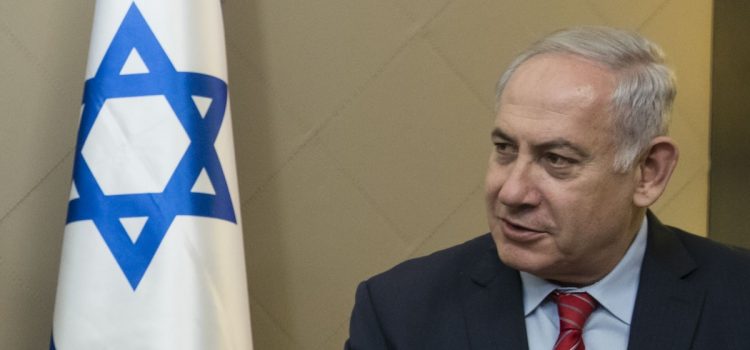

This article is an excerpt from the Shortform guide to "NPR News Now". Shortform has the world's best summaries and analyses of books, podcasts, and more.
Like this article? Sign up for a free trial here.
What does Israeli Prime Minister Benjamin Netanyahu say about Israel’s presence in Gaza? What are the consequences for Gaza’s civilian population as a result of the Israeli military activities?
On NPR, Netanyahu discussed his commitment to Israel’s mission in Gaza. The NPR News Now episode also explored the impacts of Israel’s persistent military presence in Gaza and the critical consequences for Gaza’s civilian population, with high casualty counts and resource limitations adding to their plight.
Continue reading for a summary of this podcast episode from NPR News Now.
Image source: President.gov.ua, CC BY 4.0, via Wikimedia Commons
Benjamin Netanyahu on NPR
In an interview on NPR, Netanyahu stated that Israeli forces in Gaza aren’t going anywhere. He highlighted how critical Israel is in putting the brakes on and preventing a comeback of terror groups such as Hamas, pointing out that Israel’s authority is key to keeping the region stable.
Consequences for Gaza’s Civilian Population
NPR’s Korva Coleman shared the bleak report that over 11,000 deaths have been counted by Palestinian health officials. Plus, the United Nations has said that roughly 2,700 people, including an estimated 1,500 kids, are missing. They’re assumed to be buried under the rubble from Israeli bombings.
Making things worse, Israel is limiting fuel, which has led to a communication blackout. This makes the area even more isolated.
Netanyahu didn’t mention any plans for how they’re going to manage civilian life in Gaza amid the ongoing conflict.
Context
The Israeli-Palestinian conflict is among the world’s longest-continuing conflicts, characterized by frequent tensions between Israel and Gaza. To grasp recent developments, it’s crucial to understand this conflict’s history and Hamas, a Palestinian militant group. The conflict initiated in the mid-20th century with calls for a Jewish homeland in Palestine, leading to the 1947–1949 Palestine War.
At the heart of this conflict is Gaza, a small territory on the Mediterranean Sea’s eastern coast. Ever since Israel’s military occupation during the 1967 Six-Day War, strict control over Gaza’s borders and airspace has been enforced. Israeli Prime Minister Benjamin Netanyahu recent commitment to maintain a security presence in Gaza, and the ensuing consequences of Israeli surveillance on civilians, are notable additions to this ongoing narrative.
Key themes in this summary include international security measures, the impacts of surveillance on civilian populations, and the humanitarian crisis in Gaza. Surveillance as a security measure spark questions about its effectiveness and potential human rights violations. Additionally, it’s clear that these strategies can worsen an already critical humanitarian crisis due to Israel-imposed restrictions.
As for future resolutions of this multifaceted issue, the path remains uncertain. It depends on various factors like the actions taken by the Israeli government as well as international community responses addressing the humanitarian crisis faced by Gaza’s population under Israel’s strict surveillance and restrictions.
Learn more:
- Netanyahu’s two-front war against Hamas and for his own political
- How to avoid misinformation about the war in Gaza – Poynter
More Perspectives
Claims about Israeli security measures in Gaza need a hard look. Yes, a long-term security presence may suppress and prevent terror groups, but we shouldn’t overlook its potential downsides. Constant military occupation and surveillance could fan the flames of resentment among Palestinians, possibly worsening the regional violence and instability. To truly resolve the Israeli-Palestinian conflict, we need to address both sides’ root concerns, not just banking on security measures that might just fuel grievances.
Also, highlighting the devastating effects of Israeli surveillance on Gaza shouldn’t overshadow the fact that conflicts are complex. Zooming in solely on surveillance risk simplifying the whole issue. Confirming casualty figures and investigating disappearances are crucial for holding anyone accountable for potential breaches of international humanitarian law. We can’t ignore wider issues like Gaza blockades enforced by Israel and Egypt that increase regional suffering. Dialogue and diplomacy are key to addressing these problems and securing long-term peace.
So, understanding Israeli security measures in Gaza means looking beyond military presence. By tackling root issues, fostering conversation among all parties, and striving for lasting solutions that respect every individual’s rights and dignity, we stand a better chance of achieving lasting peace in this deep-seated conflict.
Related Summary
Wherever You Live, Big Brother Is Watching You
Mass surveillance has become a daily part of life, as corporations and governments around the world openly collect data about who we are and how we live our lives. But, has this always been the case? And, if not, how did we get here?

———End of Preview———
Like what you just read? Read the rest of the world's best guides to NPR News Now" at Shortform.
Here's what you'll find in our full NPR News Now episode summaries:
- Condensed news stories from a respected public media organization
- All of the day’s key events wrapped up succinctly
- Coverage of up-to-date news stories even when you’re short on time






